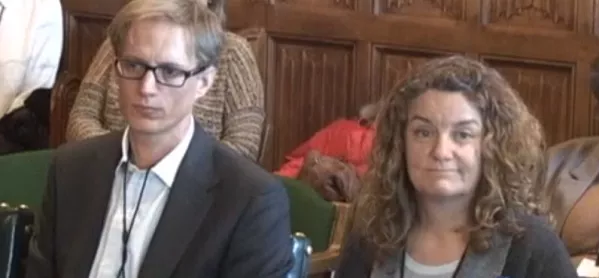- Home
- Councils have SEND ‘conflict of interest’, parents warn
Councils have SEND ‘conflict of interest’, parents warn

The special educational needs and disabilities (SEND) system creates a conflict of interest within local authorities, parents of children with SEND told MPs today.
Councils are tasked with drawing up education, health and care plans, which outline what provision children with SEND need to help them fulfil their potential, but they are also responsible for ensuring that provision is funded.
This dual role was the “biggest failure” of the SEND system, parent George Holroyd, whose son is blind and autistic, told the Commons Education Select Committee today.
“The biggest failure of the system for me is still the same as it was before - which is the people who define the needs of your child, who advise you, in fact, on their needs…they are also the people paying for it, a different part of the same council is then paying for it,” Mr Holroyd said.
“If you have strong views about what your child needs and you can back it up, then you have a high chance of getting that.
“If you don’t really know - you’re busy, you’re working, you’ve got other kids - then they will be defined much more narrowly, even within the same county. So you can have very similar children who have very different provision…based completely on the parents.”
Other parents giving evidence echoed this view.
“A lot of the antagonistic behaviour comes from the local authority being caught between the law, which says it’s a needs-based system, and the funding, which is a ration system,” said Penny Hoffman-Becking, a trustee of the now-closed SEND family voice, a parent-carer forum for Kingston and Richmond.
Beth Foster, of the Hampshire Parent Carer Network, said that a lot of parents recognised the “game of chicken” that local authorities played over who would give up first as they moved towards a tribunal.
“I think it’s quite a bullying kind of tactic,” she said. “But I know a lot of our parents have recognised that sort of behaviour and I think it comes down to there [being] little resources and trying to figure out where to put them and who is going to fight hardest for it.”
When asked by committee chair Robert Halfon if the system was particularly adversarial, Ms Hoffman-Becking replied: “Many parents are living in a constant state of anxiety. Even if you’ve managed to secure something good now, there is always the worry that it will be cut next month or next year, and our children are uniquely vulnerable.”
Finding a way through the ‘maze’
Mrunal Sisodia, co-chair of the National Network of Parent Carer Forums, said that some parents who did not know how to work the system might benefit from “key workers” from independent advice and support services.
“The parents who are the most vulnerable need key workers who can help them navigate the system. As long as the system is going to stay a maze, you need local support, people who understand the local system, who can talk to them face-to-face.”
Commenting on the evidence, Anntoinette Bramble, chair of the Local Government Association’s Children and Young People Board, said: “We face a looming crisis in meeting the unprecedented rise in demand for support from children with SEND.
“Parents rightly expect and aspire to see that their child has the best possible education and receives the best possible support.
“Councils have pulled out all the stops to try and do this, but are reaching the point where the money is simply not there to keep up with demand.
“Schools are also being pushed to the brink by the underfunding of SEND, at a time when there is already severe pressure on general schools funding.
“This risks creating a perfect storm, where not only does this mean schools can’t provide the extra support pupils with SEND need, but it means other pupils and teachers suffer the consequences of funding being squeezed on a daily basis, by not getting the support in the classroom that they need.”
The hearing came as Ofsted launched its annual report, which has raised concerns about the “worrying gaps” in SEND provision around the country.
The DfE has been contacted for comment.
Keep reading for just £1 per month
You've reached your limit of free articles this month. Subscribe for £1 per month for three months and get:
- Unlimited access to all Tes magazine content
- Exclusive subscriber-only stories
- Award-winning email newsletters



